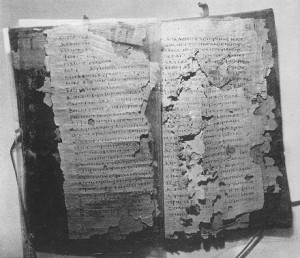
Continuing the series archived at Couchoud: The Creation of Christ – – – (Couchoud argues that our “editor” – Clement? – compiled 28 books, one more than our current 27 that make up our New Testament and this post concludes the section where Couchoud discusses the origin of our New Testament books.)
The perfect balance of the New Testament still stood in need of a counterweight. Just as the tale of Peter counter-balanced that of Paul in Acts, so the letters of Paul required as counterpoise letters from the Twelve. There were already in existence a letter by James and three by John. To make up seven, our editor produced two letters by Peter and one by Jude, John’s brother. (p. 305)
I don’t know if Couchoud here means to suggest “the editor” wrote these epistles himself. I find it difficult to accept the two letters attributed to Peter are by the same hand given what I have come to understand of their strikingly different styles, but let’s leave that question aside for now and cover what Couchoud’s views were as published in English 1939.
1 Peter
This epistle is said to have been a warrant for the Gospel of Mark. (Maybe, but some have suggested the name of Mark for the gospel was taken from this epistle. If it were a warrant for Mark one might be led to call to mind the unusual character of that Gospel. Its reputation had been tinged with “heretical” associations.) In the epistle Peter calls Mark “my son” and is supposed to be in his company in Rome, biblically called “Babylon”. The inference this leads to is that Mark wrote of the life and death of Jesus as learned from the eyewitness Peter. This coheres with Justin’s own naming of the Gospel “Recollections of Peter” in his Dialogue, section 106.
The letter is “a homily addressed to baptized heathen of Asia Minor at the time of a persecution.” Its teachings can be seen to be of the same category as those addressed in the earlier discussions by Couchoud – typical of Clement and anti-Marcionite . . . Continue reading “2 Peters, 1 Jude and 2 Revelations: the first New Testament (Couchoud)”
